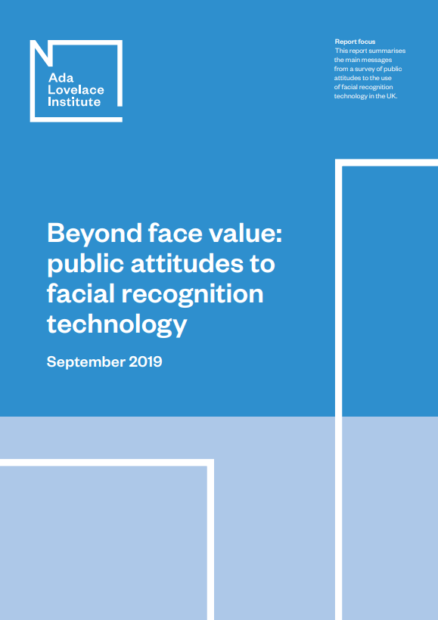Beyond face value: public attitudes to facial recognition technology
First survey of public opinion on the use of facial recognition technology reveals the majority of people in the UK want restrictions on its use
2 September 2019

The first national survey of public opinion on the use of facial recognition technology reveals the majority of people in the UK want companies, the government, and public bodies to limit use of the technology including by the police and in schools.
Published today by the Ada Lovelace Institute, the survey shows that the British public are prepared to accept use of facial recognition technology in some instances, when there is a clear public benefit and where appropriate safeguards are put in place, but they also want the government to impose restrictions on its use.
The Ada Lovelace Institute is calling for companies to temporarily stop selling and using facial recognition technology while the public is consulted on its use. It will lead public consultation by establishing the Citizens’ Biometric Council, a citizens’ assembly supported by the Information Commissioner’s Office.
The nationally representative survey of 4,109 adults was undertaken in partnership with YouGov and reveals:
- A majority of people (55%) want the government to impose restrictions on police use of facial recognition technology. Nearly one third (29%) of the public are uncomfortable with police using facial recognition technology in any circumstance.
- Nearly half the public (46%) want the right to opt out of the use of facial recognition technology. This figure is higher for people from minority ethnic groups (56%), for whom the technology is less accurate.
- Most people oppose the use of facial recognition technology by companies for commercial benefit, often because they don’t trust the technology will be used ethically. For example, 77% are uncomfortable with facial recognition technology being used in shops to track customers and 76% are uncomfortable with it being used by HR departments in recruitment.
- The public supports companies voluntarily pausing sales of facial recognition technology to police (50%) and schools (70%) to allow for further public consultation.
- People fear the normalisation of surveillance but are prepared to accept facial recognition technology when there is a clear public benefit, provided safeguards are in place. For example, nearly half (49%) support the use of facial recognition technology in day to day policing, assuming appropriate safeguards are in place, but the majority are opposed to its use in schools (67%) or on public transport (61%).
Findings from the survey are summarised in a new report from the Ada Lovelace Institute, Beyond face value: public attitudes to facial recognition technology. It provides much-needed evidence on public attitudes at a time when police use of facial recognition technology is being challenged in the courts and the Information Commissioner is investigating its deployment in the Kings Cross area of Central London.
Carly Kind, Director of the Ada Lovelace Institute said: “These findings show that companies and the government have a responsibility to act now. The UK is not ready for facial recognition technology. As a first step, a voluntary moratorium by all those selling and using facial recognition technology would enable a more informed conversation with the public about limitations and appropriate safeguards. To model the values we espouse, we are setting up a Citizens Biometric Council, a citizens’ assembly that will bring experts and citizens together to ensure the public can play an active role in shaping the use of facial recognition and other similar biometrics technologies – an approach that has been endorsed by the Information Commissioner.”
Jonathan Bamford, Director of Strategic Policy from the Information Commissioner’s Office said: “The Information Commissioner’s Office welcomes this valuable insight on public attitudes to facial recognition technology and is very pleased to support the Ada Lovelace Institute’s Citizens’ Biometrics Council, following on from its own extensive citizen engagement work through the use of citizen juries to understand public attitudes to explainability in AI. The Council will bring much-needed informed public perspective to the development of public policy on emerging biometrics technologies such as facial recognition and fingerprint scanning.’’
Publication of the survey coincides with the High Court judgment on the use of live facial recognition technology by South Wales Police.
In response to the judgment, Carly Kind said:
“Today’s judgment on the legality of police trials of facial recognition in South Wales brings into sharp relief the gap between public expectations and current regulation. The first national survey of public opinion on facial recognition technology published today by the Ada Lovelace Institute shows that the majority of people in the UK want police use of this technology restricted.
“The fact that the deployment of a new technology, with which a significant proportion of the public are not comfortable, can be deemed technically compliant underlines the need for an informed public discourse on what new restrictions and safeguards are needed. Facial recognition technology may be lawful, but that does not mean its use is ethical, especially outside of the very limited circumstances examined by the court in this case.”
Rt Hon Norman Lamb MP, Chair of the Science and Technology Committee said:
“My committee, the Science and Technology Committee, has already called for the government to issue a moratorium on the current use of facial recognition technology and that no further trials should take place until a legislative framework has been introduced and guidance is published on trial protocols, and an oversight and evaluation system, has been established.
“The recent report by the Ada Lovelace Institute, Beyond face value, provides insight into public attitudes towards the use of facial recognition, and underscores the need for an independent review of the governance ecosystem for biometric data.”
Policy impact
Responding to citizen concerns, we led the call for a moratorium or pause in the use and deployment of facial recognition technology, which has now been reinforced by a diverse range of organisations including the UK House of Commons Science and Technology Select Committee.
The timeliness of the investigation is reinforced by subsequent US technology companies’ actions: IBM, who pulled out of the facial recognition technology market citing concerns about ‘racial profiling and violations of basic human rights and freedoms’, Microsoft, who pulled back from selling facial recognition systems to police departments until there is a federal law and Amazon, who banned police use of facial recognition technology for a year.
The global move towards questioning the legitimate uses of this technology is the result of years of work from organisations like the Cardiff-based Data Justice Lab and New York-based AI Now, and researchers Joy Buolamwini, Timnit Gebru and Deborah Raji, collecting evidence of injustices in social and technical infrastructures and systems and individuals to shift power imbalances.
Publication of the survey coincided with the High Court judgement on the use of live facial recognition technology by South Wales Police. In response to the judgement, Carly Kind said:
‘Today’s judgement on the legality of police trials of facial recognition in South Wales brings into sharp relief the gap between public expectations and current regulation. The first national survey of public opinion on facial recognition technology published today by the Ada Lovelace Institute shows that the majority of people in the UK want police use of this technology restricted.
‘The fact that the deployment of a new technology, with which a significant proportion of the public are not comfortable, can be deemed technically compliant underlines the need for an informed public discourse on what new restrictions and safeguards are needed. Facial recognition technology may be lawful, but that does not mean its use is ethical, especially outside of the very limited circumstances examined by the court in this case.’
Media coverage
Related content

Biometrics and facial recognition technology – where next?
Proposing a way forward for regulators, policymakers and industry in the UK based on emerging public attitudes research.

Facial recognition: defining terms to clarify challenges
Facial recognition technology is a complex area, which means the risk of misunderstandings is high.

Facial recognition technology needs proper regulation – Court of Appeal
The appeal of R (Bridges) v Chief Constable of South Wales shows that, when it comes to facial recognition technology, the status quo cannot continue.

Facial recognition and policing – a test case of technology and consent
Giles Herdale argues for urgent action on biometric technology to preserve the principle of policing by consent in a digital age.